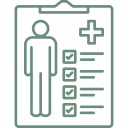Menu
What is the process for booking a treatment abroad?
To book a treatment, you can start with a paid teleconsultation to discuss your medical needs with our specialists. Following the consultation, we'll assist you in selecting a partner hospital, arrange travel logistics, and book your treatment dates.
Will I need to undergo pre-treatment tests upon arrival?
Yes, many providers require pre-treatment tests like blood work, imaging, or physical exams to confirm you’re fit for the procedure and to tailor the treatment plan.
How much can I expect to save by choosing medical treatment abroad?
Depending on the destination and procedure, you can save between 30% and 80% compared to prices in Western countries. Prices are often lower due to factors like lower living costs and exchange rates, not necessarily lower quality.
What’s included in the cost of the treatment package?
Treatment packages may include pre-op tests, surgery, hospital stay, medications, follow-up visits, and sometimes even airport transfers and accommodation. Always request a detailed cost breakdown to understand exactly what is covered.
Are there hidden or extra costs I should be aware of?
Potential extra costs include post-op medication, extended hospital stays, additional tests, and non-medical expenses like accommodation and local transport. Always ask for a comprehensive estimate.
What medical information do I need to provide to the clinic or hospital?
You should provide recent medical records, including diagnostic reports, any imaging (e.g., X-rays, MRIs), lab results, and details of current medications. Your local doctor may also need to supply a referral letter.
How long does it take to schedule the treatment after initial contact?
Scheduling varies depending on the clinic and the type of procedure. Typically, once your medical records are reviewed, treatments can be scheduled within weeks, often sooner than in your home country.
What happens during the first consultation?
The first consultation can be in-person or virtual. The doctor will review your medical history, discuss the treatment plan, answer your questions, and explain the procedure, risks, and recovery process.
How do payment and deposits work?
Most providers require a deposit to confirm the booking, with the remaining balance paid before or upon arrival. Payment methods can include credit cards, bank transfers, or cash up to a certain limit in foreign currency. Make sure to confirm payment details in advance.
Is financing available for medical tourism?
Some clinics and medical tourism facilitators offer financing plans or payment options. Additionally, specialized medical loans and certain health insurance plans may cover international treatment.
Frequently Asked Questions
Start by researching destinations and healthcare providers that specialize in your required treatment. Once you find a suitable provider, contact them for consultation. They’ll typically ask for your medical records and offer a treatment plan and cost estimate.
You should provide recent medical records, including diagnostic reports, any imaging (e.g., X-rays, MRIs), lab results, and details of current medications. Your local doctor may also need to supply a referral letter.
Scheduling varies depending on the clinic and the type of procedure. Typically, once your medical records are reviewed, treatments can be scheduled within weeks, often sooner than in your home country.
The first consultation can be in-person or virtual. The doctor will review your medical history, discuss the treatment plan, answer your questions, and explain the procedure, risks, and recovery process.
Yes, many providers require pre-treatment tests like blood work, imaging, or physical exams to confirm you’re fit for the procedure and to tailor the treatment plan.
Depending on the destination and procedure, you can save between 30% and 80% compared to prices in Western countries. Prices are often lower due to factors like lower living costs and exchange rates, not necessarily lower quality.
Treatment packages may include pre-op tests, surgery, hospital stay, medications, follow-up visits, and sometimes even airport transfers and accommodation. Always request a detailed cost breakdown to understand exactly what is covered.
Most providers require a deposit to confirm the booking, with the remaining balance paid before or upon arrival. Payment methods can include credit cards, bank transfers, or cash up to a certain limit in foreign currency. Make sure to confirm payment details in advance.
Our goal is to deliver a seamless, worry-free experience, guiding patients through every step, from their initial consultation to their return home, fully recovered.

Calculate BMI

Request call-back

Telemedicine consultations

Hospital Network














